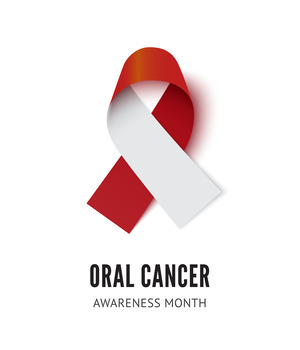
Compared to other types of cancer, you might not hear oral cancer being discussed quite as often. But this doesn’t mean you shouldn’t be concerned about it. Each year, over 54,000 cases of oral cancer are diagnosed, and it causes roughly 11,000 deaths. As part of Oral Cancer Awareness Month in April, you should take the time to learn as much as you can about this disease – including the risk factors and the warning signs.
What Kinds of Oral Cancer Are There?
First, it’s important to know that there are two main classifications of oral cancer. The first is cancers of the oral cavity, which can affect your lips, your gums, the floor and roof of your mouth, the inside of your cheeks, and the front part of your tongue. The other category is cancers of the oropharynx, which can occur in your throat, on your tonsils, or on the back part of your tongue.
No matter what kind of oral cancer you have, it can potentially have deadly consequences. This is particularly the case for cancers that aren’t identified until they have already started to spread.
What are the Risk Factors for Oral Cancer?
One of the most well-known risk factors for oral cancer is the use of tobacco products. This includes cigarettes and cigars as well as chewing tobacco. Drinking alcohol can also increase your chances of suffering oral cancer. In fact, people who smoke and drink alcohol are around 30 times more likely to develop the disease.
Other risk factors include (but are not limited to):
- Gender: Anyone can get oral cancer, but it’s more common in men.
- Weight: Studies show that being overweight can increase your risk for cancers of the oropharynx.
- Age: Since it takes time for oral cancer to develop, it tends to occur later in life, often around or past the age of 55.
What are the Warning Signs of Oral Cancer?
There are several symptoms that can potentially point to oral cancer, including:
- Irritation or sores in the mouth that don’t go away after a certain amount of time.
- Strange red or white patches on your soft tissues.
- Pain and tenderness.
- Having trouble swallowing, chewing, or speaking.
- Constantly experiencing the sensation of having something caught in your throat.
- Odd lumps.
If you happen to notice any of these symptoms, and if they persist even after two weeks, you should seek help from a professional. Of course, you might not always be able to catch the warning signs of oral cancer on your own. Fortunately, if you visit your dentist every six months for a checkup, they can screen for oral cancer symptoms and let you know if you have anything to be concerned about.
About the Author
Dr. Michael C. Byars is proud to be able to help improve the health and well-being of his patients. He treats entire families at his practice in Kansas City, and he performs an oral cancer screening as part of each preventive checkup. If you would like to schedule a consultation with Dr. Byars, visit his website or call (816) 781-8222.

